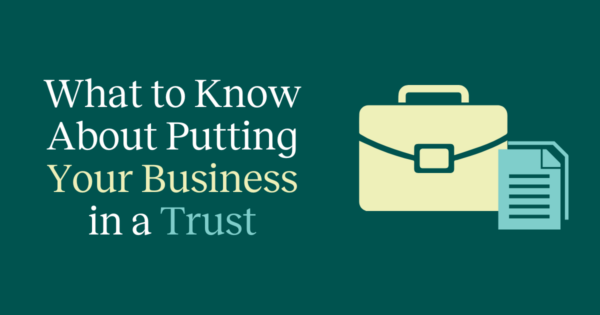With many things in life, when you make a mistake, you fix it, learn from it, and move on. With estate planning, though, your mistakes may not manifest until after you’re gone. No learning, no fixing, no moving on. These mistakes can have lasting effects for your loved ones—from simple to serious—so let’s take a look at how you can avoid the six most common estate planning errors.
1. Not making a plan.
Let’s get the biggest estate planning mistake out of the way first. You need some sort of estate plan in place to ensure your loved ones are taken care of after you die. You can make all the excuses you want—I’m not old enough, or rich enough, or smart enough to make a plan—but we’re here to help make it a simple and smooth process.
2. Not talking about your plan.
Discussing your estate plan with your loved ones and your executor or trustee guarantees that they are clear about your wishes and won’t be confused or surprised regarding anything in your documents. It also provides an opportunity for candid conversations about what your beneficiaries really want. For example, you might think that leaving your house to your daughter is a great gift, but she might be planning to move out of state. Talk through issues like these, because your estate plan is meant to prepare, not burden, your loved ones. While you’re having these discussions, be sure to note where your original, signed estate planning documents are located (in a safe deposit box or file cabinet, or with a lawyer), and if you’re storing any electronic copies on your computer or online (like in the Wealth Vault) and how to access them.
3. Not thinking more broadly about your legacy.
It might seem easiest when you’re creating your estate plan to leave everything to one beneficiary. Don’t forget: your estate plan is your last opportunity to leave something meaningful to your favorite charity or someone who would find the most meaning in a prized possession of yours. Your estate encompasses all your possessions. Perhaps you would like to leave old photographs with your niece, who keeps the family genealogy, or you would like to leave a last cash gift to the animal shelter where you have volunteered for years.
4. Not leaving a full inventory of your assets.
When it comes time to distribute your assets, your executor or trustee will need to gather (marshall) all your assets. Without an up-to-date record of everything you own, some assets can get lost. Retirement accounts, storage units, safe deposit boxes, and cryptocurrency are all commonly forgotten or lost during administration. If these assets are left unclaimed, they may never make it to your chosen beneficiaries. For example, it’s estimated that over 20% of all 401K funds are lost or forgotten.
5. Neglecting your online assets.
Maybe your grandparents didn’t have to worry about digital assets, but nearly everyone today has some sort of online account that will need to be managed after their death. You should think about whether you want your loved ones to take down (or continue to manage) your social media accounts, preserve important files you stored in the cloud, access software for smart systems that run your house, and download your digital photos. Consider leaving the usernames and passwords for your smartphone and most important online accounts with your estate planning documents.
6. Forgetting that your estate plan isn’t just for after you die.
Several important estate planning documents help you manage affairs while you’re still alive. Establishing a financial power of attorney and a health care power of attorney will appoint someone to help with legal, financial, and medical decisions when you’re unable to make them for yourself. For some people, setting up a trust allows a trustee to step into your shoes more easily if you need help managing your affairs during your life.
Whether you’re creating your estate plan from scratch or updating an existing plan, being aware of these common mistakes can help you avoid them.



